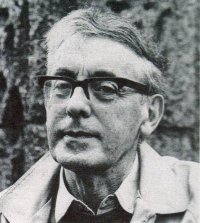
A Cornish Poet Extraordinaire
Web: www.causleytrust.org
Charles Stanley Causley CBE FRSL (24th August 1917 – 4th November 2003) was a Cornish poet, school teacher and writer. His work is often noted for its simplicity and directness as well as its associations with folklore, legends and magic, especially when linked to his native Cornwall.
Causley was born at Newport in Launceston, to Charles Samuel Causley, who worked as a groom and gardener, and his wife Laura Jane Bartlett, who was in domestic service. He was educated at the local primary school and Launceston College. When he was seven, in 1924, his father died from long-standing injuries incurred in World War I.
Causley left school at sixteen, working as a clerk in a builder's office. He played in a semi-professional dance band, and wrote plays—one of which was broadcast on the BBC West Country service before World War II.
He enlisted in the Royal Navy in 1940 and served as an ordinary seaman during the Second World War, firstly aboard the destroyer HMS Eclipse in the Atlantic, at shore bases in Gibraltar and north-west England. Later he served in the Pacific on the aircraft carrier HMS 'Glory', after promotion to petty officer.
Causley later wrote about his wartime experiences (and their longer-term impact on him) in his poetry, and also in a book of short stories, Hands to Dance and Skylark. His first collection of poems, Farewell, Aggie Weston (1951) contained the 'Song of the Dying Gunner A.A.1':
Farewell, Aggie Weston, the Barracks at Guz,
Hang my tiddley suit on the door
I'm sewn up neat in a canvas sheet
And I shan't be home no more.
After demobilisation in 1946, he took advantage of a government scheme to train as a teacher at Peterborough. He then worked full-time as a teacher at his old school for over 35 years, teaching for his very final year at St. Catherine's CofE Primary elsewhere in the town, where the National School had been relocated. He twice spent time in Perth as a visiting Fellow at the University of Western Australia, and also worked at the Banff School of Fine Arts in Canada.
Causley travelled still more widely and frequently, however, after taking early retirement in 1976 to pursue a full-time career in writing.
He was much in demand at poetry readings in the United Kingdom and worldwide—the latter travels were sometimes as part of Arts Council and British Council initiatives. He also made many television and radio appearances over the post-war period, particularly for the BBC in the West Country, and as the presenter for many years of the BBC Radio 4 series Poetry Please.
In 1952 Causley was made a bard of Gorsedh Kernow adopting the bardic name Morvardh (Sea poet). In 1958 Causley was made a Fellow of the Royal Society of Literature, and he was made a CBE in 1986. When he was 83 years old he was made a Companion of Literature by the Royal Society of Literature: he greeted this award with the words, "My goodness, what an encouragement!"
Other awards include the Queen's Gold Medal for Poetry in 1967 and a Cholmondeley Award in 1971. In 1973 he was visiting fellow in poetry at the University of Exeter, from which institution he received an honorary doctorate on 7th July 1977.
In 1982, on his 65th birthday, a book of poems was published in his honour that included contributions from Ted Hughes, Seamus Heaney, Philip Larkin and twenty-three other poets, testifying to the respect and indeed love that the British poetry community had for him. This was followed by a fuller and more wide-ranging tribute (including some unpublished reflective essays, and reproductions of several drafts of his poem 'Immunity' from his archive at Exeter University), published in 1987 and entitled Causley at 70.
Causley's popularity amongst general readers and listeners, particularly among the Cornish, remains high, and also appears to be expanding. A Causley piece that has gained attention is "Eden Rock", a reflection on childhood, memory, family and mortality.
Causley's popularity amongst general readers and listeners, particularly among the Cornish, remains high, and also appears to be expanding. A Causley piece that has gained attention is "Eden Rock", a reflection on childhood, memory, family and mortality. Its opening lines are:
They are waiting for me somewhere beyond Eden Rock:
My father, twenty-five, in the same suit
Of Genuine Irish Tweed, his terrier Jack
Still two years old and trembling at his feet.
Poet Laureate Sir Andrew Motion has said that if he could write a line as perfect as the one which closes this poem, he would go to his grave a happy man. The full text of "Eden Rock" accompanies a recording on the Poetry Archive website of Causley himself reading it (amongst several other poems) aloud, shortly before his death in 2003.
Cornish Authors Launceston Famous Cornish People